
Joe Logan Diffie was an American country music singer and songwriter. After working as a demo singer in the mid 1980s, he signed with Epic Records' Nashville division in 1990. Between then and 2004, Diffie charted 35 singles on the Billboard Hot Country Songs chart, five of which peaked at number one: his debut release "Home", "If the Devil Danced ", "Third Rock from the Sun", "Pickup Man" and "Bigger Than the Beatles". In addition to these singles, he had 12 others reach the top 10 and ten more reach the top 40 on the same chart. He also co-wrote singles for Holly Dunn, Tim McGraw, and Jo Dee Messina, and recorded with Mary Chapin Carpenter, George Jones, and Marty Stuart.
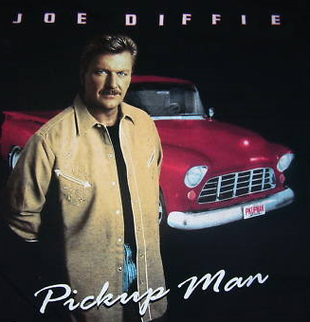
"Pickup Man" is a song written by Howard Perdew and Kerry Kurt Phillips, and recorded by American country music artist Joe Diffie. It was released in October 1994 as the second single from the album Third Rock from the Sun. The song was his longest-lasting number-one hit, having spent four weeks at number one on the Billboard Hot Country Singles & Tracks chart between December 1994 and January 1995.

"So Help Me Girl" is a song written by Howard Perdew and Andy Spooner and recorded by American country music singer Joe Diffie. It was released in January 1995 as the third single from his fourth studio album, Third Rock from the Sun (1994). The song reached number two on the Billboard Hot Country Singles & Tracks chart, where it debuted at number 59 for the week of February 4, 1995, and number 84 on the Billboard Hot 100.
Joe Diffie was an American country music artist. His discography comprises 12 studio albums, six compilation albums and 38 singles. Among his albums, 1993's Honky Tonk Attitude and 1994's Third Rock from the Sun are his best-selling, having been certified platinum by the Recording Industry Association of America (RIAA) for shipments of one million copies. His singles include five Number Ones on the Hot Country Songs charts: "Home", as well as "If the Devil Danced ", "Third Rock from the Sun", "Pickup Man" and "Bigger Than the Beatles".

Honky Tonk Attitude is the third studio album by American country music artist Joe Diffie. Released in 1993, it features the singles "Honky Tonk Attitude", "Prop Me Up Beside the Jukebox ", "John Deere Green", and "In My Own Backyard", which respectively reached #5, #3, #5, and #19 on the Hot Country Songs charts. The song "If I Had Any Pride Left at All" was later recorded by John Berry on his 1995 album Standing on the Edge, from which it was released as a single.
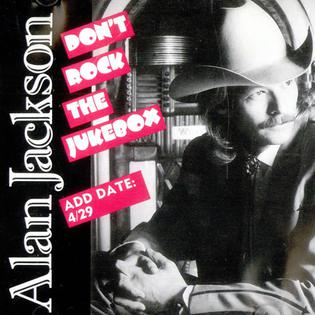
"Don't Rock the Jukebox" is a song by American country music artist Alan Jackson. It was released on April 29, 1991 as the lead single from the album of the same name. It was his second consecutive Number One single on the U.S. Billboard Hot Country Singles & Tracks charts. Jackson wrote the song with Roger Murrah and Keith Stegall.

"Bigger Than The Beatles" is a song written by Jeb Stuart Anderson and Steve Dukes, and recorded by American country music artist Joe Diffie. It was released in November 1995 as the lead single from the album, Life's So Funny. The song reached Number One on the U.S. Billboard Hot Country Singles & Tracks chart, becoming the fifth and final Number One single of Diffie's career. It also reached number-one on the Canadian RPM Country Tracks chart.

"Someday" is a song written by American country music singer Alan Jackson and Jim McBride, and recorded by Jackson. It was released in August 1991 as the second single from Jackson's second album, Don't Rock The Jukebox. The song peaked at number 1 on the Billboard Hot Country Singles & Tracks chart, and number 2 on the Canadian RPM Country Tracks chart.

"Honky Tonk Attitude" is a song co-written and recorded by American country music artist Joe Diffie. It was released in March 1993 as the lead single and title track from his album Honky Tonk Attitude. The song reached the top five of the Billboard Hot Country Singles & Tracks chart and peaked at number 11 on the Canadian RPM Country Tracks chart. The song was written by Diffie and Lee Bogan.
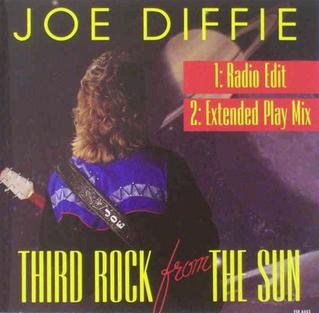
"Third Rock from the Sun" is a song written by Sterling Whipple, Tony Martin and John Greenebaum, and recorded by American country music artist Joe Diffie. It was released in July 1994 as the lead single and title track from his album Third Rock from the Sun. The song became Diffie's third Number One single on the Hot Country Singles & Tracks chart. The song also became his first number one hit since "If the Devil Danced " in 1991.
"If You Want Me To" is a song co-written and recorded by American country music singer Joe Diffie. It was released in December 1990 as the second single from his debut album A Thousand Winding Roads. The song reached the Top 5 on the Billboard Hot Country Singles & Tracks chart. The song was written by Diffie and Larry Williams.
"If the Devil Danced " is a song written by Ken Spooner and Kim Williams, and recorded by American country music singer Joe Diffie. The song reached the top of the Billboard Hot Country Singles & Tracks chart. It was released in April 1991 as the third single from his debut album, A Thousand Winding Roads.

"Is It Cold In Here" is a song co-written and recorded by American country music singer Joe Diffie that reached the Top Five on the Billboard Hot Country Singles & Tracks chart. It was released in December 1991 as the first single from his album Regular Joe. The song was written by Diffie, Kerry Kurt Phillips and Danny Morrison.
"Next Thing Smokin'" is a song co-written and recorded by American country music artist Joe Diffie. It was released in August 1992 as the third single from the album Regular Joe. The song reached #16 on the Billboard Hot Country Singles & Tracks chart. The song was written by Diffie, Danny Morrison and Johnny Slate.
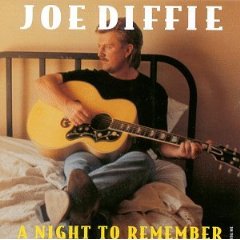
"A Night to Remember" is a song written by Max T. Barnes and T.W. Hale, and recorded by American country music singer Joe Diffie. It was released in March 1999 as the first single and title track from his album A Night to Remember. The single peaked at number 6 on the U.S. Billboard Hot Country Singles & Tracks chart. The song also crossed over to the Top 40 on the Billboard Hot 100, where it peaked at number 38.
"Texas Size Heartache" is a song written by Zack Turner and Lonnie Wilson, and recorded by American country music singer Joe Diffie. It was released in March 1998 as the first single from his Greatest Hits compilation album, for which it was one of three newly recorded songs. It reached a peak of number 4 on the country music charts in mid-1998. The song's b-side, "Poor Me," was also issued as a single later in 1998, reaching number 43 on the same chart.
"John Deere Green" is a song written by Dennis Linde, and recorded by American country music artist Joe Diffie. It was released in November 1993 as the third single from his album Honky Tonk Attitude. The song peaked at number 5 on the country charts.
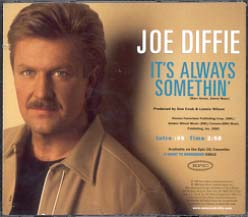
"It's Always Somethin'" is a song written by Aimee Mayo and Marv Green, and recorded by American country music artist Joe Diffie. It was released in February 2000 as the third single from his album A Night to Remember. It peaked at number 5 on the U.S. Billboard Hot Country Singles & Tracks chart and number 11 on the Canadian RPM Country Tracks chart.

"Brother Jukebox" is a song written by Paul Craft. It was originally recorded by Don Everly, one-half of The Everly Brothers, in 1977 and reached number 96 on the country singles charts. It was later covered by Keith Whitley on I Wonder Do You Think of Me and by Mark Chesnutt on his 1990 debut album Too Cold at Home. Released in November 1990 as the album's second single, it became his first Number One country hit in the United States. It was also recorded by John Starling on his 1977 album Long Time Gone.
"If I Had Any Pride Left at All" is a song written by John Greenebaum, Troy Seals and Eddie Setser, and recorded by American country music artist John Berry. It was released in October 1995 as the third single from the album Standing on the Edge. The song reached number 25 on the U.S. Billboard Hot Country Singles & Tracks chart but peaked at number 11 on the Canadian RPM Country Tracks chart.













